- Home
- Joe R. Lansdale
Hap and Leonard: Blood and Lemonade Page 7
Hap and Leonard: Blood and Lemonade Read online
Page 7
At home our guest came nervously through the front door between Mama and me as if expecting a surprise attack, and when Mama hit the light switch, he jumped a little.
“Why don’t you go to the bathroom and wash up, and I’ll fix you something to eat. Would you like that?”
Nathan didn’t answer, just looked around. Our house wasn’t much, and my mother was not a great housekeeper, but she painted, and she had several of her paintings on the walls. She was a pretty amazing hobby painter, but I didn’t know it at the time. It’s just what she did when she was on a kind of manic high. The high was followed by a lull, and then a drop into a depressed place where the walls around it were for a time too steep for her to climb.
“Those are pretty,” Nathan said, pointing toward the paintings.
“Thank you,” Mama said. “I painted those.”
“You did?” Nathan said.
“I did.”
“I ain’t never known someone could do that. I wish I could.”
“Practice,” Mama said, and she went into the kitchen and left us standing there in the middle of the living room.
“Let me show you where the bathroom is,” I said. “You can get that blood off your face.”
I headed in that direction, and when I turned around in the hall, he wasn’t there. I had to go back to the living room and say, “Nathan. Right here.”
Nathan came unstuck from looking at the paintings, went to the bathroom and closed the door. I stood out in the hall like a hall monitor at school. I didn’t know what else to do. I could hear the water running in there. After a moment the door opened. Nathan said, “Are there any towels for me? I can wipe on my pants.”
I found this curious, not knowing quite yet that anything a black person touched was supposedly contaminated, so I said, “Use the one hanging on the rack.”
“Ain’t that your towel?”
“It’s a towel,” I said.
“I got blood on me.”
“It’s alright,” Mama called from the kitchen. “It’ll wash.”
“Okay,” he said, went back inside and closed the door. After a few moments he came out again.
“You find the towel?”
He nodded, looked down the hallway. We could see my mama in the kitchen at the end, hustling around at the edge of the stove. She turned from it and came down the hall. She took Nathan’s chin in her hand and gently turned his head from side to side.
“You might ought to have a band aid.”
She got a box of them out of the bathroom cabinet and pulled one out, came out into the hall, and applied it to the small cut on Nathan’s head.
“There now,” she said. She went back to the bathroom, washed her hands, dried on a fresh towel, and went back to the kitchen.
“Your mama’s nice,” Nathan said.
“Yeah, she is. You like funny books?
He looked at me and nodded.
I started for my bedroom. Nathan followed after me, still cautious.
We weren’t well off, poor actually, but at this short time in my early life we had it pretty good. My dad was a mechanic. He worked for a butane company repairing their trucks, chasing them when they broke down in other parts of Texas, Oklahoma, and Louisiana. He might go to work in the morning and not be back until late at night, or even the next morning, having gone over to Manny Louisiana, some place in Oklahoma or almost any place in Eastern Texas. Wherever a company truck might break down. Within a year of the time I’m talking about, Daddy would be worn out working for someone other than himself, and would end up opening his own shop. We never had much money after that, but he was happier, and to be honest, I didn’t realize the difference much until I was grown and could look back on it. I didn’t know we were poor. We always thought of ourselves as broke, but at that moment in time, we were doing as well as we ever did. There were so many others around us doing worse. Black families especially.
Nathan came into my bedroom, leaving the door open as if he might need to beat a hasty retreat. I opened my closet, and there were several large boxes there with comics stacked inside. I pulled one out, opened the box, and dug in. I grabbed a stack of funny books and we sat down on the floor. Nathan and I looked through them, and out of nowhere, he said, “I want to be the Flash. I could run off anywhere and no one would know I was gone, and then I’d be back, and they wouldn’t even had known I’d run across the ocean, gone over to some place there, and come back.”
“I like that he can run across the water,” I said.
“Me too,” Nathan said, “but I get to thinking about what if I was him, and I slowed down? I’d be wet all over and a shark might get me.”
“Flash runs too fast to get bit,” I said, “and he won’t slow down, and you was him, you wouldn’t either.”
“Yeah, but I ain’t him. He’s white.”
I realized I had never seen a black superhero, or for that matter, any black characters in comics. It had never occurred to me a black superhero was possible. I thought of most blacks as maids and short-order cooks, farmers and janitors. That’s what they did in Marvel Creek. Those were their jobs.
“You boys come eat,” Mama called from the kitchen. Through the open door we could see down the hall and into the kitchen. Mama was wearing an apron and hustling plates of food onto the table.
We went into the kitchen. I sat down immediately, but Nathan remained standing.
“Sit down,” Mama said. “This isn’t at the Dairy Queen or such. You don’t have a special place where you have to be.”
I got it a little more then. Nathan was not only unaccustomed to being with white folks, he was unaccustomed at being allowed to sit at their tables, instead of some designated spot for colored. I was starting to absorb the idea that being colored meant you always had to be on your toes.
Nathan sat down and Mama put a plate in front of him. There were some fried hamburger patties, slices of tomato, some broken up lettuce in bowls. We had plain light bread, as we used to call it, and she had busted open a loaf and laid the bread on a platter. There was a big pitcher of ice tea, a bottle of ketchup, and a jar of mustard.
Mama started making herself a sandwich with the bread, meat and vegetables, and I followed suit. Nathan still hadn’t moved.
“We got mustard and ketchup, you want it,” Mama said.
“No, ma’am,” Nathan said. “Dry is fine.”
Then Nathan came unstuck and poured himself some ice tea, and made a sandwich. He would have gladly eaten in silence, I’m sure, but Mama didn’t play that way.
“You finish eating, Nathan, maybe you got someone we can call?”
Nathan didn’t respond to that.
I should add we had recently gotten a telephone, and for us that was a big deal. It was a party line, which meant we shared it with two others, had our own ring, and that meant, of course, that someone on the party line could listen into your conversations if they took a mind to. Now and again you could hear them breathing on their end. I remember Mama saying, “Mildred, get off the line. This is a private call.”
Still, we had a phone, and it was a step up from where we had been. We also had a new TV, a larger set than the one before, and with two cars, ragged as they were, my parents probably felt they had stepped up in the world. It was a step that would become slippery in short time.
“We ain’t got a phone, and my cousin don’t neither, and I don’t want to go where he stay anyway,” Nathan said. “I’d be by myself if I could get in.”
“I can understand that perfectly,” Mama said. “I get by myself, I turn lonely. I like to at least be able to open a window, look out and see a bird, listen to it sing. Birds singing is a joy to me.”
“Not many out at night,” Nathan said.
Mama laughed. “Well, I don’t mean now.”
“Oh,” Nathan said. “I get it. Some other time.”
“Just something pleasant to see and think about,” Mama said.
I glanced across the table at her, because w
hen she said that, I saw something shift in her face. I had seen it before. She called it feeling blue. That meant a memory, or maybe just a feeling, had come up from some place deep and floated onto her face, wrinkling her brow, accentuating the crow’s feet at the corners of her eyes.
“Sometimes I feel like I don’t fit,” she said.
“I know that,” Nathan said. “I get that same way.”
Mama looked at him, said, “I don’t have anything on you, do I?”
“No ma’am,” Nathan said. He sounded like an old man then, weighted down by memories and a touch of arthritis.
We finished eating, and Mama said, “Surely, you have someone I can call?”
“Mama ain’t got no phone.”
“Your cousin?”
“He don’t got one neither.”
“Surely there’s someone? Didn’t you say you had an aunt in Overton?”
Nathan considered for a long moment.
“She ain’t never home,” he said. “I got an aunt in Baton Rouge.”
“Oh, that’s a long ways,” Mama said. “Still, I think I ought to call her.”
Mama wrangled the aunt’s number out of him and picked up the phone, which was on the kitchen counter under the light switch. She dialed the number and called the aunt.
No one answered. She put the phone down.
“You said your mama was in Dallas?”
“She ought to be back by now,” Nathan said.
I glanced at the clock. It was nearly midnight.
“I’m thinking maybe I could drive you home, then,” Mama said.
“I ain’t sure how to get there,” Nathan said.
“You got an address, something that could help me find her.”
He did have an address. Getting it out of him was like trying to lift a car, but Mama finally managed and wrote it down.
“Tell you what,” she said. “You boys go look at funny books. I’m going to get a Tyler map and see if I can figure out where this address is.”
Back in my bedroom we went back to looking at funny books. Nathan had loosened up. We sat on the floor and talked about funny-book characters, and the movie we had seen that day. He liked the monster movie, and that led us to talking about other monster movies we had seen. It was great to have someone that cared about that stuff as much as me.
After a time, Mama came into the bedroom and said, “I think I got it figured out. We might have to pull over some and have me study the map, but I think we can go now.”
“I could stay here tonight,” Nathan said.
“I don’t know, hon,” Mama said.
“Oh, yeah,” Nathan said. “I forgot.”
“No,” Mama said. “It’s not that. You should be home. Your mama will be worried.”
“She thinks I’m at my cousins.”
“But you’re not, and she thinks you are,” Mama said. “I don’t think that’s good.”
There was an uncomfortable moment, and then Nathan said, “Yeah. I better go home.”
“I’m going to pull the car out of the carport, you boys come out and we’ll go.”
I got up and prowled around in my closet and came up with a stack of comic books, doubles of comics I already had. I gave them to Nathan.
“These for me?”
“Sure. I got some more.”
“Thanks,” he said. “You been real nice.”
We went out to the car, not bothering to turn off the light or lock the door. We didn’t lock doors much in those days. They used to say locks were for keeping honest people out, and lights make the bad folks think you’re at home.
I sat in the backseat with Nathan. Mama looked back at me when I sat down back there, seemed as if she might say something, then didn’t.
We drove out of Marvel Creek, over the Sabine River bridge. We drove past what was then called Hell’s Half Mile, a series of honky-tonks. I remember driving by there with Dad at the wheel, and he said, “You see that tree out back of that beer joint? They hung a nigger there once, back in the forties. Reckon he wasn’t but twelve years old. Raped some white girl. I used to have a postcard they made from a picture they took.”
It was then that I was glad Dad was still at work, on the road somewhere. I couldn’t imagine him being mean to Nathan. I had seen him do too many kind things for colored, and I would see more when he opened his own garage, working on their cars for free when they couldn’t pay him, giving black kids money when we didn’t have any. But still, it was then that I realized my mama and daddy lived in different worlds. When Dad had talked about that hanging, it sounded as if there was a bit of pride in his voice. Mama told me later, when she put me to bed that night, “His bark is worse than his bite. Your daddy’s father used to tell your daddy when he went to bed at night, ‘You do something wrong, a nigger’s going to come get you and chop you up.’ I’m just using the word they used, but I don’t mean for you to say it. I want you to know how it was.”
It was these sorts of things that gradually allowed me to understand how things were different between us and the colored. Mama was of her time, but not in the same way as everyone else. She could see a crack in the cloud cover, a ray of light, when all the others could see was an eternal black night.
That night we were driving Nathan home, we stopped along the way a few times, and Mama sat behind the wheel with the map and a flashlight on it, studying it. I don’t know how long we drove, but it was longer than it would have taken had Nathan known how to get there, instead of just knowing the address.
Nathan and I both nodded off in the back seat, it was so comfortable, and when I awoke we had come to a dark part of town where there were no street lights and the houses seemed to tumble out of the dark beside the road.
“I don’t see any street numbers,” Mama said. “Maybe you ought to wake Nathan.”
I touched his shoulder and he came awake quickly.
Mama, who was looking over the backseat, said, “Nathan, honey. I’ve got this far, but don’t see street numbers or signs. Do you recognize this place?”
Nathan sat up and leaned over the seat and looked around. “Yes, ma’am, we about there.”
He gave Mama some instructions then, and we proceeded down the street and turned on a narrow dirt street and pulled up at the edge of a dead, brown yard with a graying little house in it. There was a white Ford parked up on the grass near the front door.
Mama got out, and me and Nathan did too, Nathan with the funny books under his arm. He ran ahead of us and knocked on the door. Nothing happened, so he knocked again, louder.
Finally a heavy colored woman came to the door, opened it, stepped out onto the concrete steps. She looked out at us, then down to Nathan.
“What you doing here?” the woman said to Nathan. “You supposed to be at your cousin’s house.”
“He left me and some white kids beat me up,” Nathan said.
“What. Come tomorrow, I’m going to drive over there to your cousin’s house and tear his ass up. Who’s this white lady?”
“I been at her house. Me and him read comics and she gave me dinner, drove me over here.”
“That right?” said the woman.
“It was no trouble,” my mama said.
“Ain’t no one asking you to do it,” Nathan’s mother said.
This stunned Mama.
“I know. We were glad to do it.”
“He don’t need some white folks helping him out, showing him how kind you is. What’s that under your arm, boy?”
“Funny books,” Nathan said.
“Where you get them?”
“He gave them to me.”
“Let me see those.”
Nathan slowly handed the stack to her.
“Come here white boy. Take these back.”
“I gave them to him,” I said.
“I don’t care you did or didn’t, come take them, or I’ll tear them up.”
I went over and took the stack from her and went back quickly to stand by Mama. We were
still back a ways from the steps, and I was starting to feel really uncomfortable.
A colored man came to the door. He was big and stout and didn’t have on a shirt.
“What’s going on here?” he said.
“These white folks done brought Nathan home and was trying to give him some funny books.”
“Johnny left me,” Nathan said.
“He did,” said the man. Then he looked out at us. “This is nice of you folks.”
“No,” said Nathan’s mother. “It’s just them showing us they got good ways. I tell you about y’all’s good ways.
Why don’t you come on up in here tonight, spend the night with us, not drive back. Tomorrow, we can all go down to the sto’ and shop for some groceries. We could then go to your house and have a tea party. You think that would be good? We can go to your church together this Sunday, and then you can come over here and we’ll sit on the couch and watch TV. Maybe we’ll go to the picture show, and you can sit up in the balcony with us.”
Mama said, “We better go.”
“Yeah, you better,” the woman said.
“Now don’t talk like that,” the man said to the woman.
“I talk like I talk,” she said.
“Thank y’all for bringing him home,” he said to us.
“Yeah, y’all such do-gooders,” said the woman. Then to Nathan. “Get your ass up in that house.”
“Come on, son,” Mama said, touched my shoulder, and headed to the car, walking fast.
“You come on back when you want that tea party,” said the woman.
We got in the car. I sat in the front this time.
As we drove off, Mama started crying.
“Damn niggers,” I said.
“Don’t say that,” she said, and pulled the car over. “Don’t say that ever again. Never use that word about colored people. Colored or Negro. Don’t you never say that.”
“Daddy does,” I said.
Mama was heaving a little, still crying. “Listen here. I’ve told you about that. Your daddy don’t know any better, but you do. Hear me?”

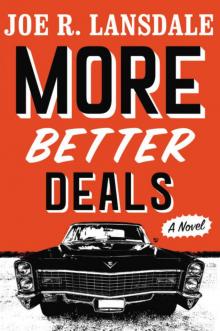 More Better Deals
More Better Deals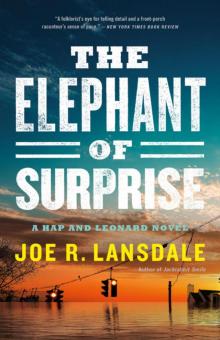 The Elephant of Surprise
The Elephant of Surprise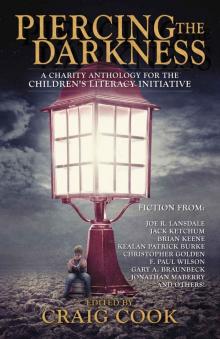 Piercing the Darkness: A Charity Horror Anthology for the Children's Literacy Initiative
Piercing the Darkness: A Charity Horror Anthology for the Children's Literacy Initiative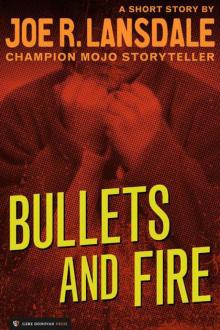 Bullets and Fire
Bullets and Fire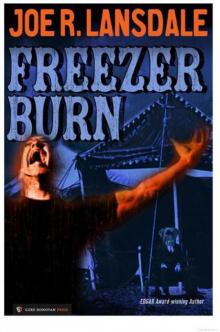 Freezer Burn
Freezer Burn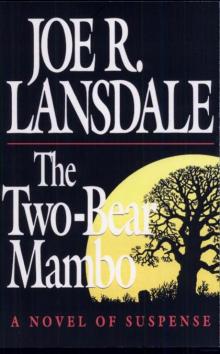 The Two-Bear Mambo
The Two-Bear Mambo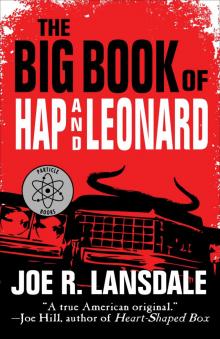 The Big Book of Hap and Leonard
The Big Book of Hap and Leonard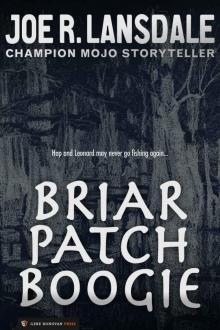 Briar Patch Boogie: A Hap and Leonard Novelette
Briar Patch Boogie: A Hap and Leonard Novelette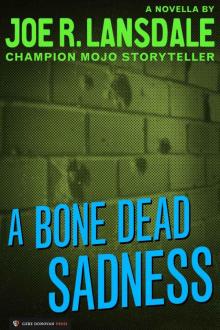 A Bone Dead Sadness
A Bone Dead Sadness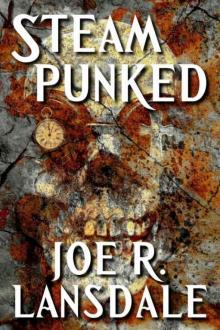 Steampunked
Steampunked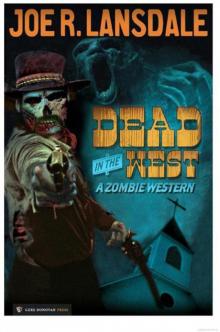 Dead in the West
Dead in the West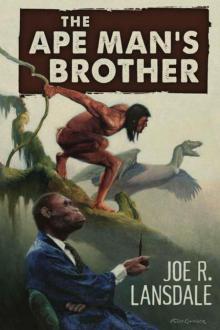 The Ape Man's Brother
The Ape Man's Brother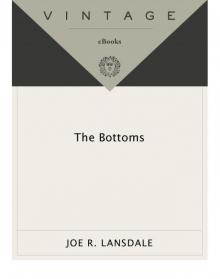 The Bottoms
The Bottoms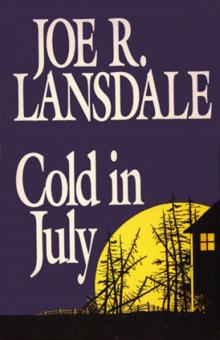 Cold in July
Cold in July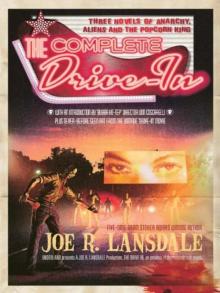 The Complete Drive-In
The Complete Drive-In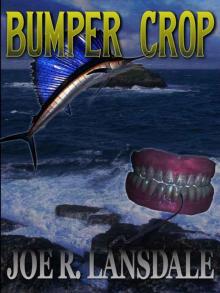 Bumper Crop
Bumper Crop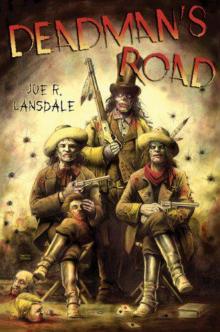 Deadman's Road
Deadman's Road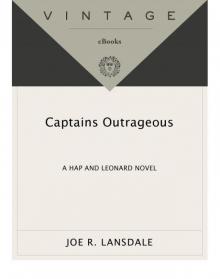 Captains Outrageous
Captains Outrageous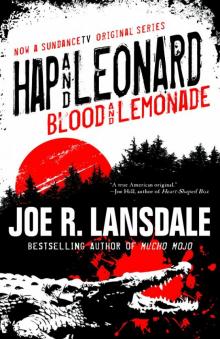 Hap and Leonard: Blood and Lemonade
Hap and Leonard: Blood and Lemonade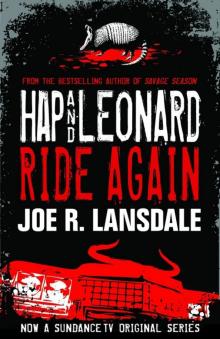 Hap and Leonard Ride Again
Hap and Leonard Ride Again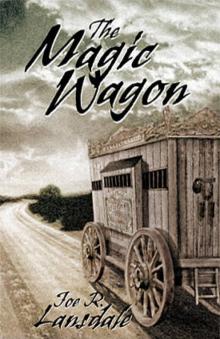 Magic Wagon
Magic Wagon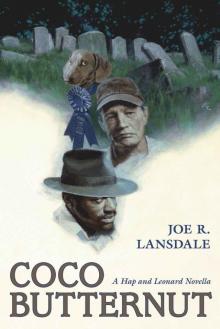 Coco Butternut
Coco Butternut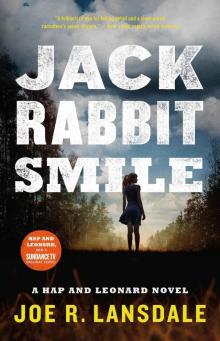 Jackrabbit Smile (Hap and Leonard)
Jackrabbit Smile (Hap and Leonard)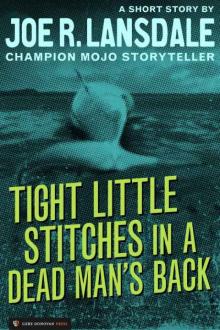 Tight Little Stitches in a Dead Man's Back
Tight Little Stitches in a Dead Man's Back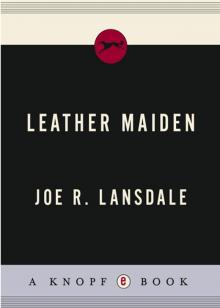 Leather Maiden
Leather Maiden Cold Cotton: A Hap and Leonard Novella (Hap and Leonard Series)
Cold Cotton: A Hap and Leonard Novella (Hap and Leonard Series)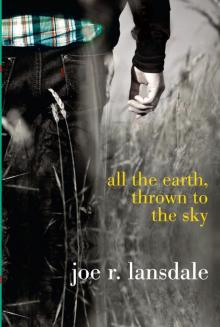 All the Earth, Thrown to the Sky
All the Earth, Thrown to the Sky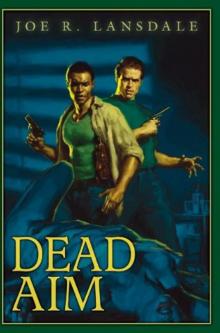 Dead Aim
Dead Aim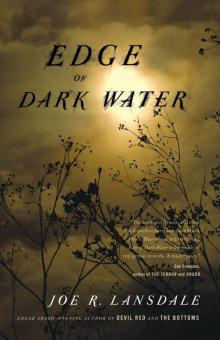 Edge of Dark Water
Edge of Dark Water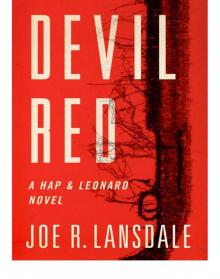 Devil Red
Devil Red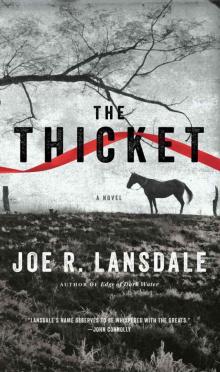 The Thicket
The Thicket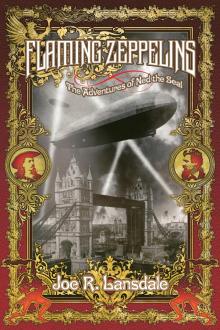 Flaming Zeppelins
Flaming Zeppelins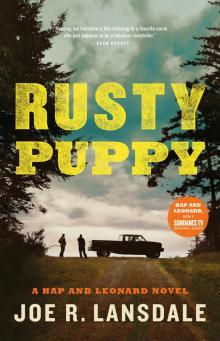 Rusty Puppy
Rusty Puppy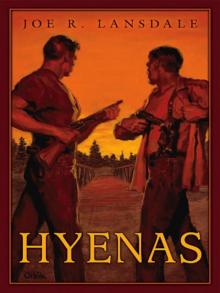 Hyenas
Hyenas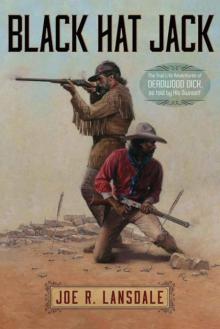 Black Hat Jack
Black Hat Jack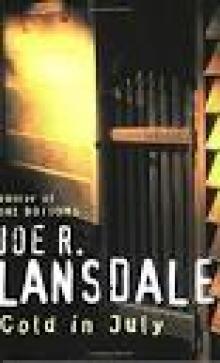 Rare Lansdale
Rare Lansdale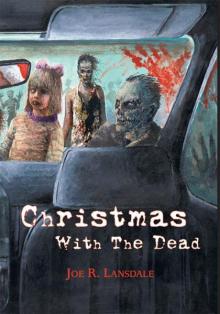 Christmas With the Dead
Christmas With the Dead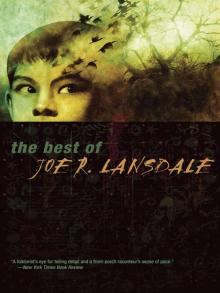 The Best of Joe R. Lansdale
The Best of Joe R. Lansdale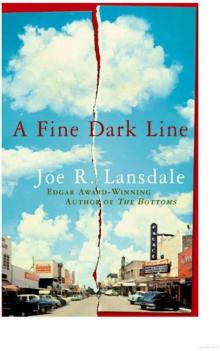 A Fine Dark Line
A Fine Dark Line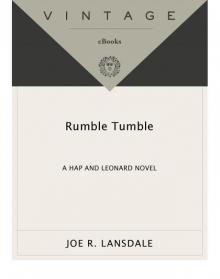 Rumble Tumble
Rumble Tumble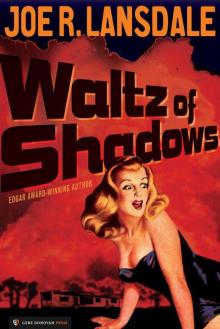 Waltz of Shadows
Waltz of Shadows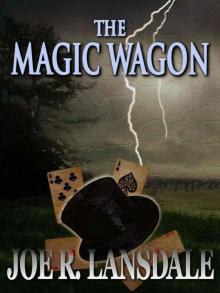 The Magic Wagon
The Magic Wagon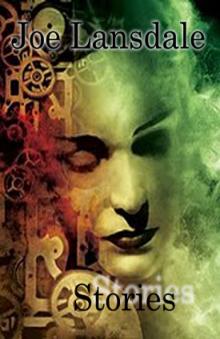 Stories (2011)
Stories (2011)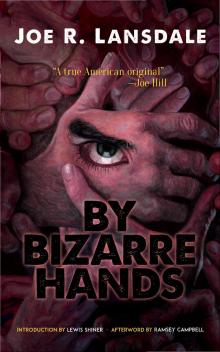 By Bizarre Hands
By Bizarre Hands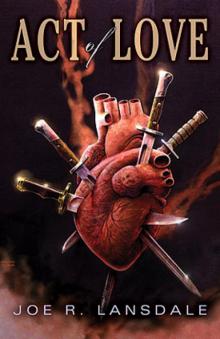 Act of Love (2011)
Act of Love (2011)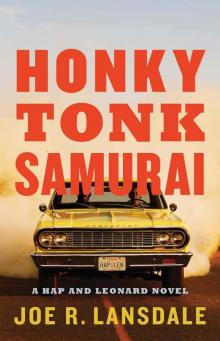 Honky Tonk Samurai (Hap and Leonard)
Honky Tonk Samurai (Hap and Leonard)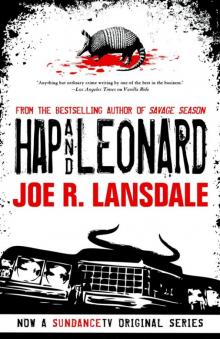 Hap and Leonard
Hap and Leonard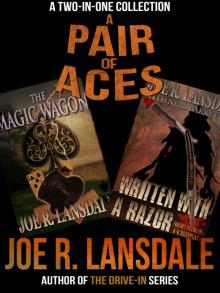 A Pair of Aces
A Pair of Aces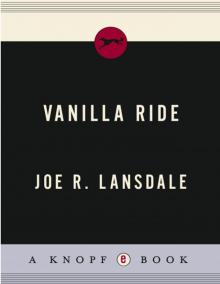 Vanilla Ride
Vanilla Ride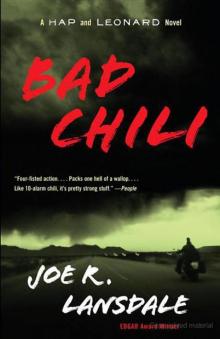 Bad Chili
Bad Chili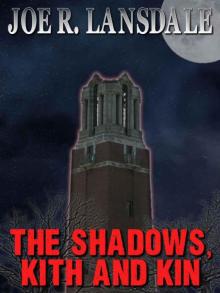 The Killer's Game
The Killer's Game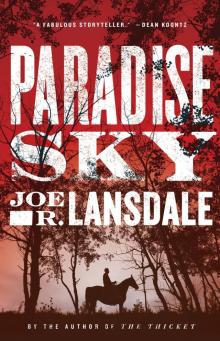 Paradise Sky
Paradise Sky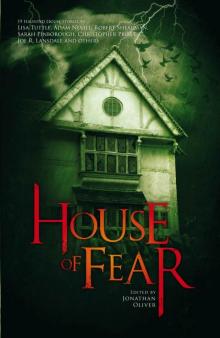 House of Fear
House of Fear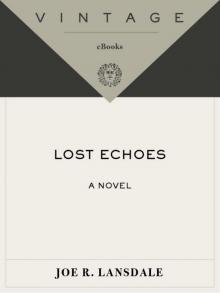 Lost Echoes
Lost Echoes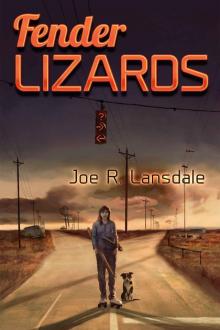 Fender Lizards
Fender Lizards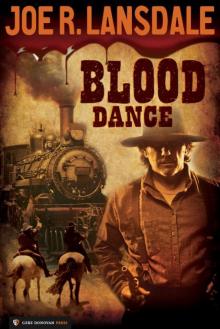 Blood Dance
Blood Dance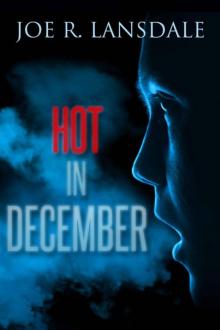 Hot in December
Hot in December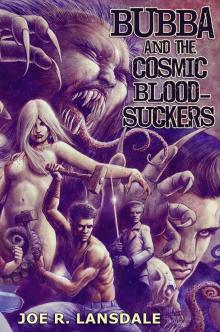 Bubba and the Cosmic Blood-Suckers
Bubba and the Cosmic Blood-Suckers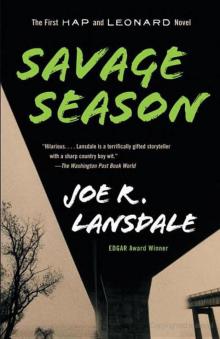 Savage Season
Savage Season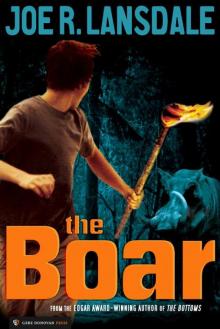 The Boar
The Boar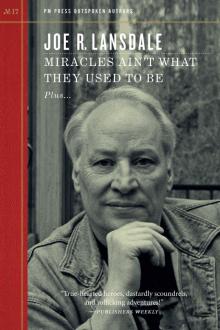 Miracles Ain't What They Used to Be
Miracles Ain't What They Used to Be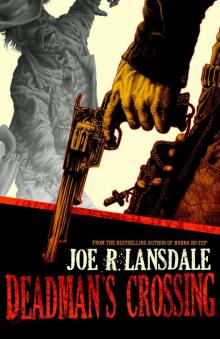 Deadman's Crossing
Deadman's Crossing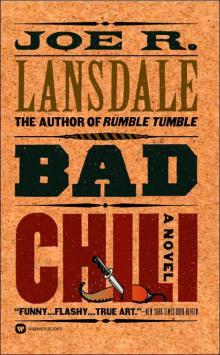 Bad Chili cap-4
Bad Chili cap-4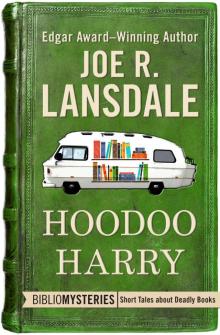 Hoodoo Harry
Hoodoo Harry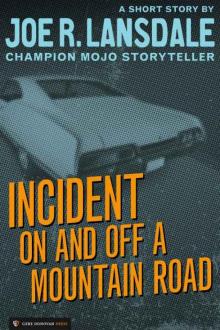 Incident On and Off a Mountain Road
Incident On and Off a Mountain Road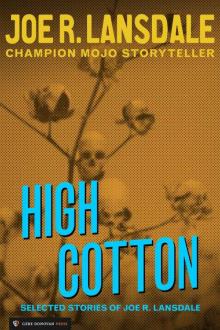 High Cotton: Selected Stories of Joe R. Lansdale
High Cotton: Selected Stories of Joe R. Lansdale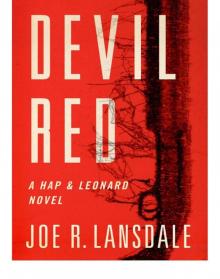 Devil Red cap-8
Devil Red cap-8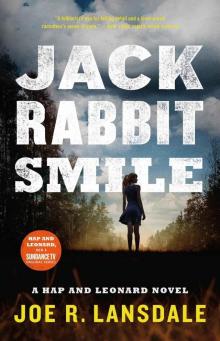 Jackrabbit Smile
Jackrabbit Smile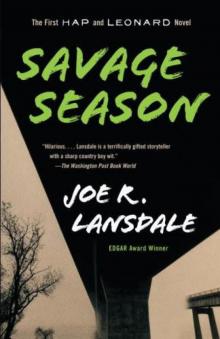 Savage Season cap-1
Savage Season cap-1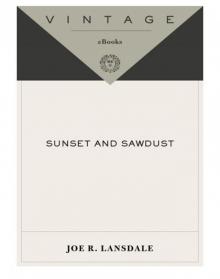 Sunset and Sawdust
Sunset and Sawdust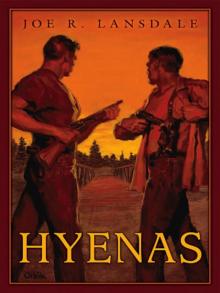 Hyenas cap-10
Hyenas cap-10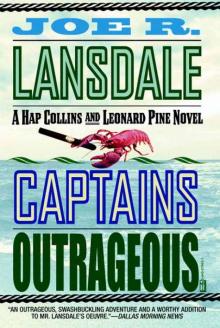 Captains Outrageous cap-6
Captains Outrageous cap-6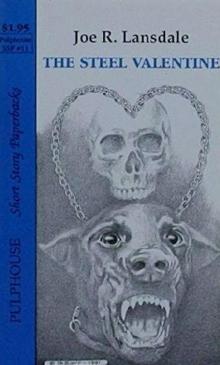 The Steel Valentine
The Steel Valentine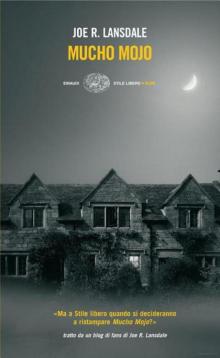 Mucho Mojo
Mucho Mojo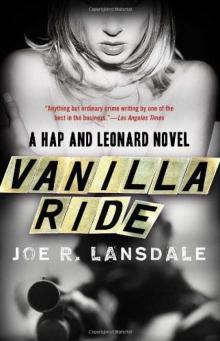 Vanilla Ride cap-7
Vanilla Ride cap-7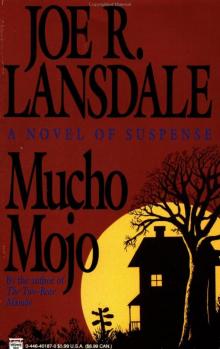 Mucho Mojo cap-2
Mucho Mojo cap-2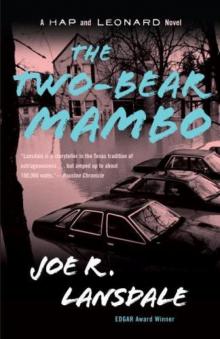 The Two-Bear Mambo cap-3
The Two-Bear Mambo cap-3